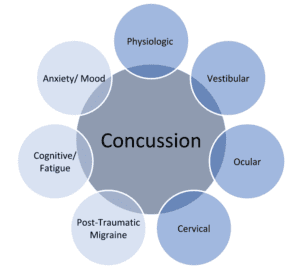Post-Concussion Syndrome (PCS)
A condition where the symptoms of a concussion persist for an extended period beyond what is considered the normal recovery time. Post-concussion syndrome is typically diagnosed when symptoms persist for weeks to months after the initial injury.

The symptoms of Post-Concussion Syndrome can vary but often include:
- Headaches: Persistent or recurrent headaches are a common symptom.
- Dizziness and Vertigo: Feeling lightheaded or experiencing a spinning sensation.
- Fatigue: A sense of ongoing tiredness or low energy levels.
- Cognitive Difficulties: Problems with concentration, memory, and other cognitive functions.
- Sleep Disturbances: Difficulty falling asleep, staying asleep, or experiencing changes in sleep patterns.
- Mood Changes: Anxiety, irritability, depression, or other mood disturbances.
The exact cause of Post-Concussion Syndrome is not fully understood, and it can affect individuals differently. Factors such as the severity of the initial concussion, pre-existing health conditions, and psychological factors may contribute to the development and persistence of symptoms.
Management of Post-Concussion Syndrome often involves a multidisciplinary approach, including:
- Rest and Gradual Return to Activity: Adequate rest during the acute phase of the injury is important. As symptoms improve, a gradual return to normal activities may be recommended.
- Symptom Management: Medications may be prescribed to address specific symptoms such as headaches or sleep disturbances.
- Cognitive Rehabilitation: Strategies to improve cognitive function and manage cognitive difficulties may be implemented.
- Physical Therapy: Rehabilitation exercises and physical therapy may be beneficial, especially if there are balance or coordination issues.
- Psychological Support: Addressing mood disturbances and providing psychological support can be crucial in managing the overall well-being of individuals with Post-Concussion Syndrome.
It’s essential for individuals experiencing persistent symptoms after a concussion to seek medical attention for a comprehensive evaluation and appropriate management. The guidance of healthcare professionals, including neurologists, rehabilitation specialists, and mental health professionals, is important for a tailored and effective treatment plan.
Proactive Care
The prevailing approach for concussion management is a “wait-and-see” strategy, hoping that post-concussive symptoms will naturally subside. This is a critical error. There are numerous proactive interventions available during the acute and post-acute phases that can accelerate recovery and minimize the likelihood of negative consequences. This is Cobblestone Medicine and Rehab’s area of expertise. Our clinic offers advanced, evidence-based interventions that are proactive in nature, effectively mitigating the risks associated with concussions.

